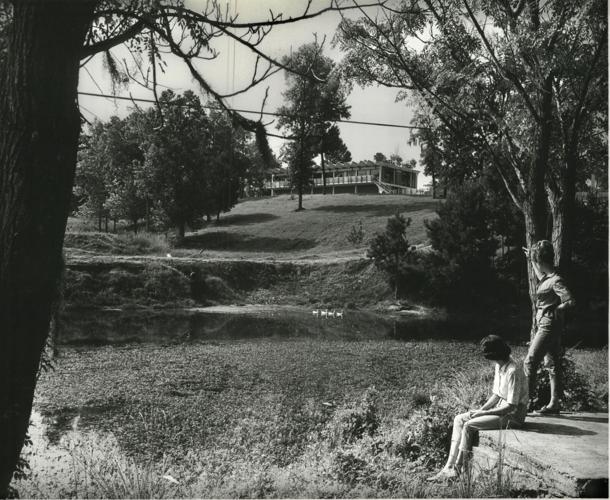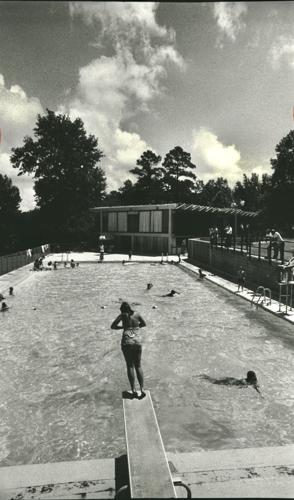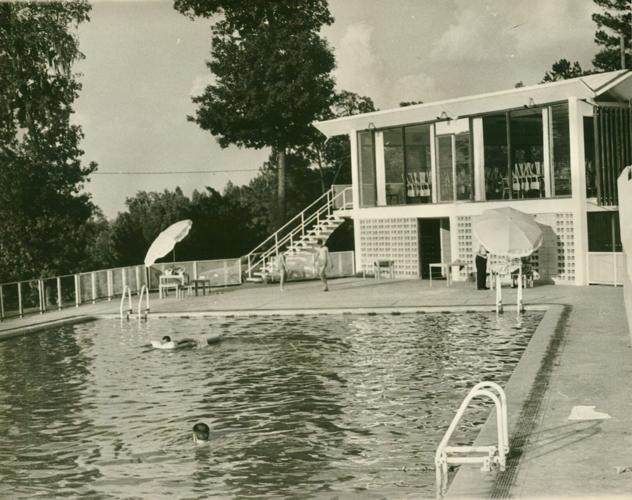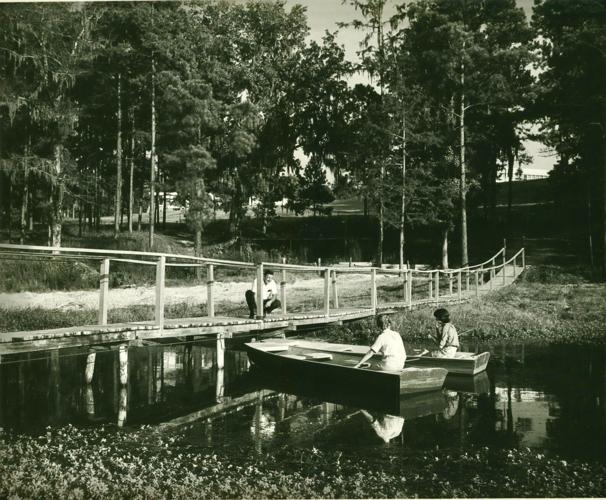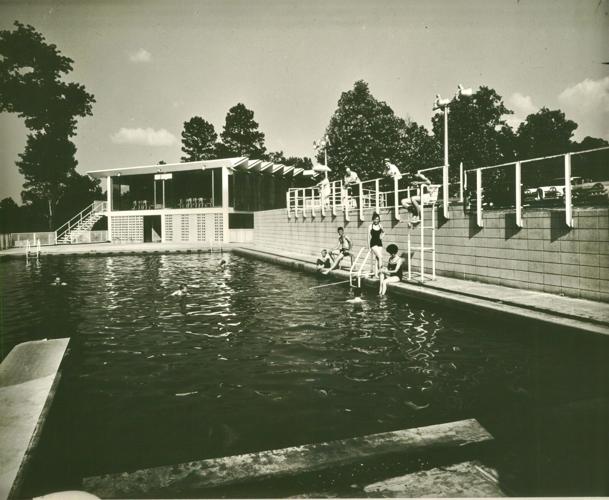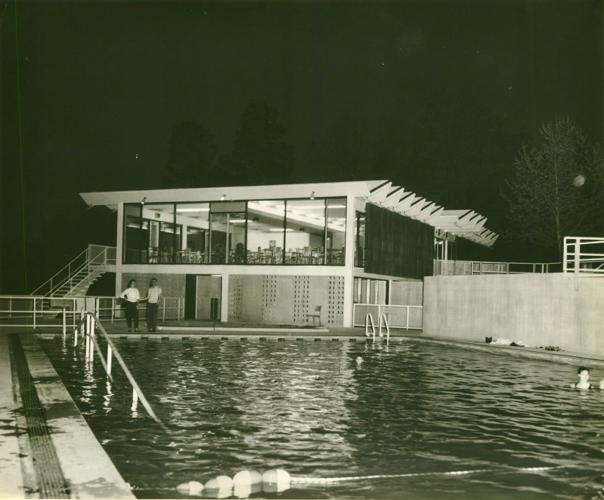
Hot Wells resort was located 15 miles northwest of Alexandria and five miles south of Boyce in Rapides Parish. The resort and its healing waters once were a tourist destination in the state.
The road to Hot Wells was filled with possibilities of fun, relaxation and a cure for whatever was ailing you.
The hope for a cure, anyway, because the hot water that flowed from the Rapides Parish resort's mineral wells was touted with the possibility of healing powers.
Nothing was guaranteed, but that didn't stop people from flocking to Hot Wells back in the day, beginning in 1913, when the bubbling mineral springs were first discovered by an oil drilling crew. It's said a crew worker with a yearslong eczema condition washed his hands in the water and noticed improvement the next day. He continued washing his hands daily in the warm water until the rash completely disappeared.
Locals knew they had something special, eventually opening a resort in 1917.
These days, Hot Wells is just a footnote in Louisiana history for those who remember going there. Ronald Juneau was one of those people.

A historical photo shows end-of-summer swimmers enjoying the modern pool and restaurant facilities at Hot Wells Resort Center, the state-run spa-resort near Alexandria. At the time this photo was taken, less than a block away, the main bath house and massage facilities were in a state of benign neglect.
The Baton Rouge resident spent time at the resort in the 1960s and wanted to know what became of the place. He also asked if President Franklin D. Roosevelt paid a therapeutic visit to Hot Wells for his polio.
The polio-stricken Roosevelt never spent time at Hot Wells, but he was so convinced of the impact that his 1924 visit to Warm Springs, Georgia, had on his therapy that he bought a home in the Meriwether County city.
He later visited Sarasota Springs in Florida and Hot Springs in Arkansas, but again, never made it to Louisiana's Hot Wells.
Still, plenty of other people passed through the resort during its 73-year run. Some years were more bountiful than others.

A swimming pool and restaurant were part of Hot Wells Resort near Alexandria. The health resort was owned by the state and closed its doors in 1986.
Before the discovery of its mineral waters, the community was known as Howerton, standing some 15 miles northwest of Alexandria and five miles south of Boyce.
"Word of the bubbling water spread, and it was said thousands found a cure or relief at the well," Larry Jorgensen wrote in his 2015 book, "Hot Wells: A Louisiana Ghost." "This was enough to persuade a group of businessmen from nearby Boyce to form the Hot Wells Sanitarium Company in 1917."
The company constructed a bath house, along with other facilities. Added attractions for sanitarium guests included a hotel, restaurant and dance pavilion.
"Guests arrived from throughout the South," Jorgensen wrote. "Later a laboratory analysis would describe the water as one of the best mineral water sources in the world."
Though Jorgensen's book is out of print, it is probably the definitive history on the resort with memories from the people who lived, worked and ran businesses in Hot Wells through the years. The book includes historical photos of the area, along with modern images of its eventual demise, including the overgrown road that once led to Hot Wells.

In the heart of the Kisatchie National Forest area, Hot Wells Health Resort near Alexandria was a pleasant place to stop and enjoy outdoor recreation and the famous mineral baths.
"If you can find the road," the caption reads, "you can follow it to what once was the resort property, which was purchased by the state in 1936."
"The state would pass it on from one agency to another, but then finally it was just declared state property, and they wouldn't do anything with it," said Jorgensen, who lives near Marksville.
A 2017 report from Alexandria daily newspaper The Town Talk points out that property ownership bounced between the state and Rapides Parish in the years after its closure, finally landing back in the state's hands.
"The state never developed it and marketed it the way private enterprise would have, in my opinion," Jorgensen told The Town Talk. "I don't know if it ever would have worked, but the way it was done, it just never really had a chance."
Jorgensen worked in radio broadcasting in the Alexandria area and was a member of the Press Club in central Louisiana, which met at Hot Springs when it was still a resort in the 1960s and '70s.

Hot Wells resort was located 15 miles northwest of Alexandria and five miles south of Boyce in Rapides Parish.
"There was a nice restaurant up on the hill in the resort, and that's where we'd meet," he said. "I always enjoyed that, and there was something about the whole facility that attracted me to it. I remember going out there several years after that, and everything was closed, but the foot baths down at the bottom of the hill were still available."
Though different agencies and operational managers kept it going through the years, the resort never measured up to Davis' prediction that it would be in Louisiana what Hot Springs is in Arkansas.
Not much was left of the resort when the state finally closed Hot Wells' doors in 1986.
"People would go out there and get water or use the foot bath, but it was in bad shape," Jorgensen said. "I think the National Guard was given control of the property, and they pretty well destroyed the place while using it for urban training."

Two of the attractions at Hot Wells, the state-owned mineral springs resort, were the swimming pool and a restaurant that overlooked the pool.
Jorgensen's interest was sparked from his time spent at the resort, but it hasn't stopped with the book, which documents how the main mineral well was sealed and the buildings leveled.
He attended a 2017 state property auction in Rapides Parish, where two Alexandria-Pineville-based companies, Ritchie Capital Management and Price Co-Development, purchased the 59-acre site for $119,000.
"Matt Ritchie is the head of Ritchie Capital Management, and I remember asking him what he was going to do with the property," Jorgensen said. "He said he didn't know, but it was too good of a price to pass up."
Today, the property is being developed by a private developer in the Alexandria area, though it likely will never return to its tourist destination status.
The water still flows below ground, but the glory days are long gone.

